How the war nearly tore apart Israel’s only Arab-Jewish women’s choir
Israel’s only Arab-Jewish women’s choir nearly folded after October. Here’s how they’ve stayed together through the war
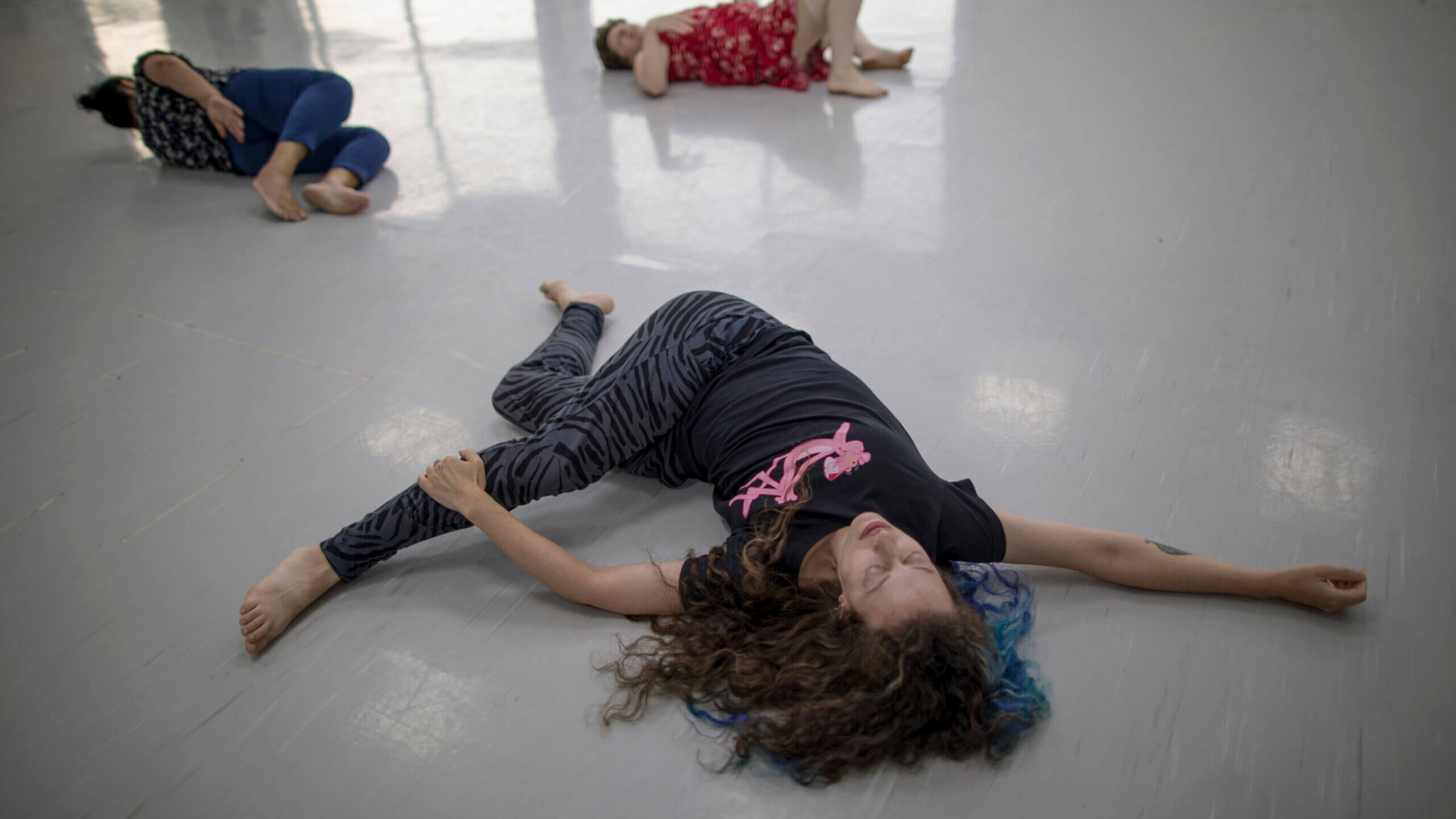
Members of the Rana Choir stretch before a rehearsal Tuesday evening in Jaffa. Photo by Rina Castelnuovo-Hollander
JAFFA, Israel — Members of the local women’s choir arrived for rehearsal one recent Tuesday with baked goods and hugs. They stretched, massaged each other’s shoulders and backs, then took their places — altos on one side of the room, sopranos on the other — to align their posture, synchronize their breathing and warm their voices up together.
I breathe freedom; don’t take my air, they sang in Arabic, starting a Lebanese tune they’d been practicing for months. Don’t push too hard or we will fall down together.
Some of the sopranos worked on holding a note longer at one point, then an alto needed to raise her voice a few bars later. The group took it again from the top, not quite nailing it, but coming close enough that I could see relief — and a hint of glee — on their faces.
It was a small but significant triumph for the Rana Choir, the only group of Arab and Jewish women singing together in Israel. Like other organizations straining toward coexistence, the choir’s 17 members have been torn up and nearly apart by Hamas’ Oct. 7 attack and Israel’s war in Gaza since. But the 16-year-old group has managed to agree on two things: that it would not perform publicly until the singers could work through their grief, and that staying together mattered more than whether anybody heard them.
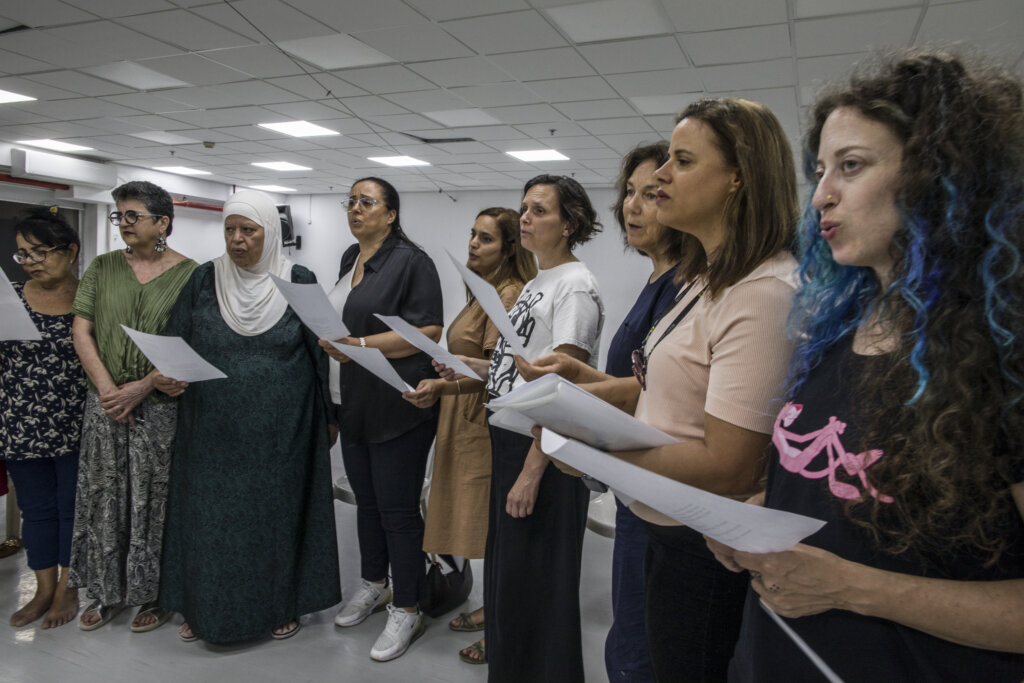
So they have continued to rehearse, meeting for a few hours each Tuesday evening in a cultural center between a Scientology building and a soccer stadium, singing folk music from across the Middle East and lullabies that could make the most hardened hearts melt.
Harmony, they have learned, is not something that can be forced.
“You wouldn’t believe how hard it still is for people with different perspectives on this mess to come together and make music,” said Mika Danny, the choir’s co-founder and director.
Amplifying voices
Danny, a 68-year-old composer and voice teacher, moved in 2003 from central Tel Aviv to Jaffa, the ancient port and fortress in the southern part of the city. About a third of its 52,000 residents are Palestinian citizens of Israel, and walking along its streets you can hear Muslim calls to prayer, reggae and ska music popular among local surfers, and the sounds of Jewish men davening, sometimes all at once.
“The absurdity and tragedy of this place is that most of the Jewish people don’t really know an Arab person other than a worker who comes to fix something in their house,” Danny said. “If they get together once a year for a dinner in the name of coexistence, they’ll say, ‘OK, I did my share, I did something for the cause.’”
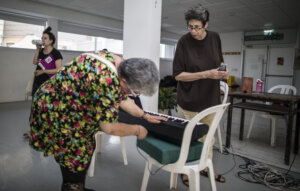
She created the Rana Choir in 2008 in hopes of connecting some of her neighbors through music and amplifying women’s voices, which she thinks are not heard enough in either culture. She recruited members regardless of choral experience, based on their openness to the idea.
“I think people listen more when we sing together than when we talk to each other,” she told me.
“Rana” can mean singing in both Hebrew and Arabic, and Danny arranges music in both languages, as well as in Persian, Yiddish and Ladino.
Before Oct. 7, the choir regularly performed at events in Jaffa and peace gatherings throughout Israel, including at the annual Joint Israeli-Palestinian Memorial Day ceremony. For a dozen years, the singers would close that event with their rendition of Chad Gaya, a song about a cycle of violence traditionally sung on Passover. No matter how many times they sing it together, members of the group told me, it still makes them shiver.
Rana declined to sing on Memorial Day here last month because some of its members said they were too deep in grief to start performing, or that doing so would be tone deaf while civilians are still being killed in Gaza.
Tough talk
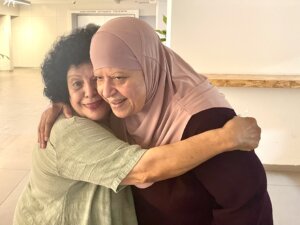
Most of the 17 singers have been with the choir since its founding. Some show up to rehearsal in yoga leggings, others in full-body chadors (a cloak worn by some observant Muslim women), and they greet each other like sisters.
“Ooh, I missed you,” Miki Oren, a 73-year-old kindergarten art teacher, squealed as she embraced Alia Hattab, a 73-year-old educator who had been absent for several weeks as she recovered from a surgery.
In the choir’s early days, Danny said, Rana’s Jewish and Arab members kept some distance, careful to avoid topics that might lay bare their differences in religion, levels of education and politics. In their 12th month together, Israel attacked Gaza in response to barrages of Hamas rocket fire. Nobody felt much like singing the upbeat Palestinian wedding song they were working on at the time, Danny recalled, so she brought in a social worker to lead a discussion about why merely being in the same room could be so difficult. Accusations flew about stealing land, blowing up buses, quashing rights, devaluing life and refusing to listen.
“Some things were not easy to say or hear,” said Rakefet Lapid, 64, a former therapist who sings in the group.
“Sometimes we cried together. Sometimes we laughed,” Hattab, a ninth-generation resident of Jaffa, told me. “Sometimes we’d get on each other’s nerves, like any friends or any family.”
Making coexistence look possible
From those early discussions about wars and terror attacks grew years of conversations about their kids and aging parents, their jobs, health challenges and marriages. Some members started speed-walking together. Others taught each other to bake bread or manage their finances. They invited one another over for dinner and celebrated milestones like Lapid’s 50th birthday 14 years ago.
“Wow, how they danced,” Lapid recalled of how her Muslim and Christian choir mates joined the largely Jewish crowd at her party.
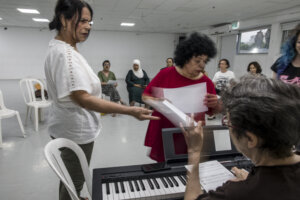
An 83-year-old Jewish singer who came to Israel from Morocco when she was a girl traveled back for the first time a few years ago with three choir members: one Muslim and two Jews. The foursome said they later heard people outside the choir speaking of the trip as if it were a sociology experiment.
In 2016, the choir won an honor in Istanbul for fostering intercultural relationships across political differences.
“Bottom line, we got an award just for being together, for holding a candle that such a thing is possible,” Lapid told me. “We were basically honored for understanding that there are 7 million Jews and 7 million Arabs between the river and the sea, and nobody is going to disappear from that picture, especially the ladies in this choir.”
Threat of collapse
That picture nearly cracked in October, when Jewish singers lost relatives and friends in Hamas’ attack on Israel — and family members of Palestinian singers went missing as Israel began its punishing response in Gaza.
“I kept calling and calling, but nobody answered; nobody still answers,” Hattab said of her relatives. “Nobody.”
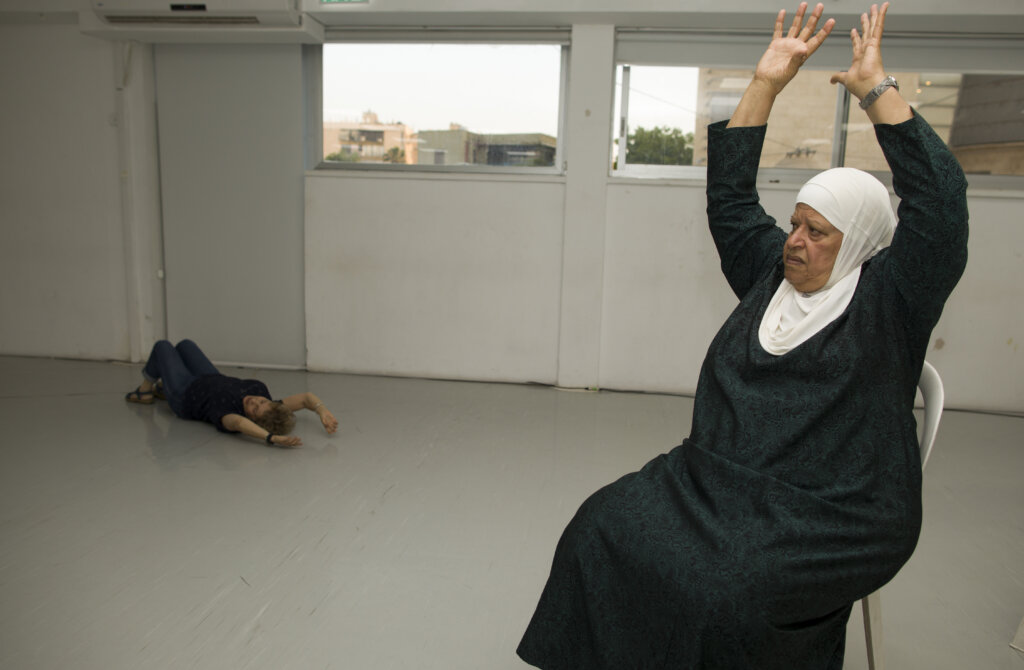
She wanted me to know that she “hurts in the heart” over the Oct. 7 attack. But she nonetheless explained it as a response to years of Israeli occupation and oppression of Palestinians, saying: “Even animals, if you hit them, will bite you.”
One Jewish member had a son in the Israel Defense Forces deployed to Gaza. Another worried she’d be slaughtered on her walk to choir practice.
The choir did not meet for a month after the massacre. “Even if I had wanted to sing, my voice wasn’t coming out in that situation,” Hattab told me. “It was blocked.”
Danny enlisted mediators, one Jewish, one Arab, for a group conversation in November. Some Jewish singers complained that they did not feel empathy over Oct. 7 from their Palestinian sisters; one said she feared they had ties to Hamas or sympathized with it.

Lapid, who grew up on Kibbutz Kfar Aza — where 62 people were killed and another 18 were kidnapped on Oct. 7 — stayed quiet. She did not talk about her cousins, who were trapped in their safe room for 11 hours. Nor did she mention the betrayal she felt, from both the Israeli government, and from Palestinians who worked on the kibbutz and, she suspected, shared details about it with terrorists.
“It makes you question what ‘like family’ really means,” she told me.
One of the Arab singers told the group she had lost faith in the possibility of coexistence. She said Jewish Israelis say what Arabs want to hear, and that she had stopped trusting what the other singers told her. A few of the Palestinian members also denied some of the Oct. 7 atrocities.
“They said there was no rape, that they didn’t kill children,” Danny recalled. “They said Muslims don’t do those things. I don’t to this day know what they believe, but it was all a lot to handle from all sides.
“It was the first time I ever thought we wouldn’t survive a crisis,” she added.
Regrouping
The choir agreed in mediation to continue gathering for weekly Tuesday evening rehearsals in the room in Jaffa’s cultural center where Jewish and Palestinian Israeli preschoolers play together during the day. It also agreed not to perform.
That meant no money from ticket sales, which put at risk a grant from Israel’s culture ministry that helps rent the rehearsal space, pay Danny and the artistic director, and fund small honoraria for the singers.
“It sent us into financial crisis,” Danny said.

The group didn’t sing at all for a few months, instead practicing movement and breathing together each week. They took long breaks for home-baked baklava, rugelach, and lots of chocolate. Some apologized for things they had said weeks earlier. Some meant to, but told me the words wouldn’t come out.
By January, members started working on small sounds; in February and March, they learned songs that Danny hoped would help them reconnect with each other and to the difficulty of the moment. “I Breathe Freedom,” the song from Lebanon, is one:
You can never eliminate me. You will listen and you will talk to me.
And if you think you are healing me, this is not the cure.
None of its singers think the Rana Choir — or any group of Israeli Arabs and Jews coming together once a week — will solve the conflict. But they said these few hours of coexistence sweeten the bitterness that has built up over the years and has felt toxic since October. The moments of harmony they’re able to squeeze out of those few hours, they told me, serve as all-too-rare reminders of what some day might be possible.
This world is big enough for everyone, the truth alone remains, the song says.
If you want us to find the solution, it will only happen if we think together.
They plan to sing it in Jaffa’s old city on June 15 — at their first concert since the war began.
















